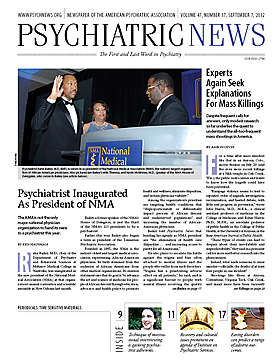The availability of federal financial incentives and the promise of improved patient care have led a growing number of physicians to begin using electronic health record (EHR) systems in their practices.
According to a July data brief from the Centers for Disease Control and Prevention’s National Center for Health Statistics (NCHS), 55 percent of physicians working in an office environment adopted the new technology last year.
However, NCHS observed a significant disparity in EHR adoption rates by practice size, with only 29 percent of physicians in solo practices reporting use of the technology in 2011, compared with 86 percent of those in practices with 11 or more physicians.
Additionally, only 50 percent of those in physician-owned practices began using EHR systems in 2011, compared with 100 percent of physicians in HMOs, 74 percent in community health centers, and 70 percent in academic health centers.
“Many of our members are solo practitioners and are therefore susceptible to the barriers that make EHR adoption difficult for this group, such as cost and limited administrative and technical resources to select, implement, and maintain EHR software,” said Robert Plovnick, M.D., M.S., director of APA’s Office of Quality Improvement and Psychiatric Services.
In an effort to help boost psychiatrists’ adoption of EHR systems, Plovnick noted that APA’s Committee on Electronic Health Records will soon be updating its section of the APA Web site
(www.psychiatry.org/ehr) with a listing of psychiatry-pertinent EHR functions and traits, as well as information on EHR systems based on a soon-to-be-conducted survey of APA member adopters.
According to Steven Daviss, M.D., chair of the Baltimore-Washington Medical Center’s Department of Psychiatry and chair of APA’s Committee on Electronic Health Records, there are several key reasons why psychiatrists have been slow to adopt EHR systems (see Barriers to EHR Adoption By Solo Psychiatric Practitioners).
But despite the comparatively low EHR adoption rate among many psychiatrists and other solo practitioners, NCHS reported generally positive feedback from physicians who have begun using the technology.
Of the more than 3,000 physicians responding to the National Ambulatory Medical Care Survey Physician Workflow Supplement, from which NCHS sourced its data, 85 percent said they were either “very satisfied” or “somewhat satisfied” with their EHR system.
Also, 74 percent of EHR adopters reported that use of the system resulted in “enhanced overall patient care.”
NCHS also noted that 77 percent of survey respondents said they have an EHR system that meets federal “meaningful use” criteria, thus qualifying them for incentive payments from the Centers for Medicare and Medicaid Services under the Health Information Technology for Economic and Clinical Health (HITECH) Act of 2009.
Demographically, NCHS observed that physicians under age 50 were significantly more likely than those aged 50 and older to adopt EHR systems (64 percent vs. 49 percent).
Among nonadopters, 48 percent said they either intend to purchase the new technology within the next year (27 percent) or have already purchased an EHR system (21 percent); 32 percent said they have no intention of purchasing a system within the next year, while 20 percent remain undecided about any future purchase.

Barriers to EHR Adoption By Solo Psychiatric Practitioners
According to Steven Daviss, M.D., chair of APA’s Committee on Electronic Health Records, current estimates indicate that up to 85 percent of APA members are solo practitioners. Daviss lists the following five reasons why he believes that physicians in solo practices are lagging behind others in obtaining new health information technology:
Systems are not designed for solo practitioners. Most EHR systems are developed for group practices, because groups are capable of paying more for the technology and have more resources to devote to system training and implementation.
Systems are not written for mental health care clinicians. It is a rare EHR system that considers the special data-management and documentation needs of mental health care specialists—from treatment planning to group therapy notes to having a place to store legally protected psychotherapy notes.
Lack of financial incentives. Most psychiatrists lack the volume of patients needed to receive significant stimulus incentives capable of defraying the cost of EHR system adoption.
Confidentiality concerns. Most EHR systems, and the health information exchanges to which they are increasingly connected, lack safeguards that permit the segmentation of different types of health care, which would allow mandated state and legal protections for addiction and mental health records to be maintained.
Usability issues. The majority of EHR systems are not designed to be highly usable by nontechnically oriented health care providers, thus requiring many hours of training and resulting in underutilization of built-in features and workarounds that affect patient care.
